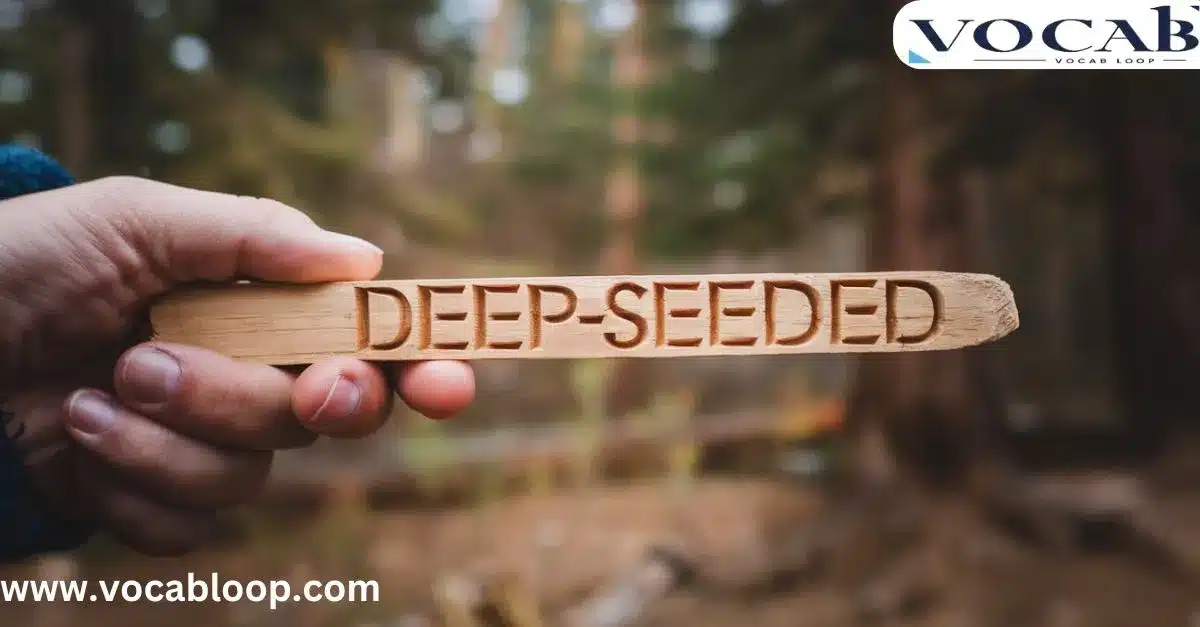When it comes to understanding deep-seeded or deep-seated: deep-seated emotions or beliefs, many of us fail to grasp just how embedded they can be. These feelings, often formed early in life, can have a significant impact on how we view the world and ourselves.
Whether it’s a deep-seated passion for a career, or a long-held belief, recognizing the roots of these emotions is the first step toward change and growth. Understanding where these deep-seated ideas come from is crucial in addressing them effectively.
Understanding Deep-Seated and Deep-Seeded
At first glance, both “deep-seated” and “deep-seeded” might seem to make sense. After all, we’re talking about something that’s firmly established, right? But as we’ll uncover, only one of these terms has legitimately taken root in the English language.
Deep-Seated: The Correct Term

Deep-seated is the correct term, and it’s been firmly established in English for centuries. But what does it really mean?
Meaning:
The term “deep-seated” refers to something that is firmly established, ingrained, or located far beneath the surface. It’s often used to describe feelings, beliefs, or problems that are difficult to change or resolve because they are so fundamental to a person or situation.
Examples:
- “Her deep-seated fear of heights prevented her from enjoying the breathtaking view from the skyscraper’s observation deck.”
- “The company’s financial troubles were deep-seated, stemming from years of mismanagement.”
- “His deep-seated passion for music led him to pursue a career as a composer despite the challenges.”
Deep-Seeded: The Misused Term

While “deep-seeded” might seem logical, especially when we think about seeds being planted deep in the soil, it’s actually a misuse of the phrase.
Meaning:
“Deep-seeded” doesn’t have an official meaning because it’s not a correct term. People who use it are usually trying to express the same idea as “deep-seated,” but they’re using an incorrect version of the phrase.
Examples of Misuse:
- “❌ His deep-seeded resentment towards his brother stemmed from childhood rivalry.”
- “❌ The town had a deep-seeded distrust of outsiders that dated back generations.”
- “❌ Her deep-seeded love for animals led her to become a veterinarian.”
Pronunciation: Sounding Out the Difference
While the spelling differs, the pronunciation of “deep-seated” and the mistaken “deep-seeded” is identical: /diːp ˈsiːtɪd/. This similarity in sound likely contributes to the confusion between the two phrases.
What Is Their Main Difference?
The main difference lies in their origins and correctness. “Deep-seated” is the correct term with a long history of use, while “deep-seeded” is a malapropism – a mistaken use of a word in place of a similar-sounding one.
Side-by-Side Comparison
To further clarify the distinction, let’s look at a side-by-side comparison:
| Aspect | Deep-Seated | Deep-Seeded |
| Correctness | ✅ Correct | ❌ Incorrect |
| Origin | From “seat” meaning “location” | Misunderstanding of “deep-seated” |
| Usage | Widely accepted in formal writing | Considered an error |
| Meaning | Firmly established or ingrained | N/A (not a real term) |
| Imagery | Something fixed in its seat or position | (Mistakenly) Something planted deeply |
Difference between American and British English
Interestingly, the confusion between “deep-seated” and “deep-seeded” isn’t limited to one side of the Atlantic. Both American and British English consistently use “deep-seated” as the correct term. However, the frequency of the error may vary between regions.
In a study of online usage, American writers were found to use the incorrect “deep-seeded” more often than their British counterparts. This could be due to the stronger agricultural associations in American culture, making the “seed” imagery more intuitive to some users.
Synonyms of Deep-Seated
To help you avoid the “deep-seeded” pitfall and expand your vocabulary, here are some synonyms for “deep-seated”:
- Ingrained
- Entrenched
- Rooted
- Fundamental
- Intrinsic
- Inherent
- Inveterate
- Profound
- Embedded
- Firmly established
Using these alternatives can not only help you avoid the “deep-seated” vs. “deep-seeded” confusion but also add variety to your writing.
Origins of Deep-Seated
The term “deep-seated” has its roots in the 16th century. It combines two concepts:
- “Deep” – indicating something far below the surface or profound.
- “Seated” – from the verb “to seat,” meaning to place in a position or to locate.
The first recorded use of “deep-seated” dates back to 1576, in George Pettie’s translation of “The Civile Conversation of M. Steeven Guazzo”:
“A deep seated malice and rooted hatred.”
Over time, the term evolved to describe not just negative emotions, but any firmly established feeling, belief, or condition.
Everyday Usage Examples
To further illustrate the correct use of “deep-seated” and common misuses of “deep-seeded,” here are 10 sentences for each:
Correct Usage of “Deep-Seated”
- The therapist helped her patient confront his deep-seated fears about commitment.
- The company’s success was built on a deep-seated commitment to customer satisfaction.
- His deep-seated love for nature inspired him to become an environmental activist.
- The deep-seated cultural differences between the two groups led to frequent misunderstandings.
- She had a deep-seated aversion to public speaking that stemmed from a childhood embarrassment.
- The politician’s deep-seated belief in social justice shaped his entire career.
- The team’s losing streak was due to deep-seated issues with management and training practices.
- Her deep-seated curiosity about the universe led her to pursue a career in astrophysics.
- The community’s deep-seated traditions were passed down through generations.
- His deep-seated passion for cooking eventually led him to open his own restaurant.
Common Misuses of “Deep-Seeded”
- ❌ The scandal revealed deep-seeded corruption within the organization.
- ❌ Her deep-seeded insecurities often manifested as aggressive behavior.
- ❌ The team’s success was built on a deep-seeded culture of hard work and dedication.
- ❌ His deep-seeded mistrust of authority figures stemmed from childhood experiences.
- ❌ The community’s deep-seeded prejudices were challenged by the new diversity initiative.
- ❌ She had a deep-seeded passion for music that began in her early years.
- ❌ The country’s economic problems were deep-seeded, requiring long-term solutions.
- ❌ His deep-seeded fear of failure often held him back from taking risks.
- ❌ The company’s deep-seeded commitment to innovation drove its success in the market.
- ❌ The deep-seeded rivalry between the two sports teams dated back decades.
FAQs: Rooting Out the Truth
To address some common questions about this linguistic conundrum, here are five frequently asked questions:
- Q: Why do people often use “deep-seeded” instead of “deep-seated”? A: The confusion likely stems from the logical association with planting seeds deeply. The imagery of a deeply planted seed aligns well with the concept of something being firmly established.
- Q: Is “deep-seeded” ever correct? A: No, “deep-seeded” is never the correct term. It’s always a misuse of “deep-seated.”
- Q: Can “deep-seated” be used for positive things, or only negative? A: “Deep-seated” can be used for both positive and negative concepts. It simply indicates that something is firmly established or ingrained.
- Q: Are there any contexts where “deep-seeded” might be acceptable? A: The only context where “deep-seeded” might be acceptable is in wordplay or puns, particularly in relation to gardening or agriculture. However, it should be clear that it’s being used intentionally as a play on words.
- Q: How can I remember to use “deep-seated” correctly? A: Think of something being firmly seated or positioned in its place. This imagery aligns with the true meaning of the phrase and can help you avoid the “seeded” mistake.
Conclusion: Planting the Seeds of Proper Usage
Understanding the difference between “deep-seated” and “deep-seeded” is more than just a matter of correct spelling. It’s about precision in language and clear communication. While “deep-seeded” might seem to make sense on the surface, diving deeper reveals that “deep-seated” is the term with true roots in the English language.
By using “deep-seated” correctly, you demonstrate a nuanced understanding of language and avoid a common pitfall that could detract from your message. Remember, language is a living thing, constantly evolving, but some distinctions are worth preserving for the sake of clarity and precision.

Alex Hormozi is a seasoned blogger at Vocab Loop, known for his deep insights into language, vocabulary, and grammar. With years of experience in writing, Alex shares practical tips and effective strategies to help readers improve their linguistic skills and enhance their writing abilities.

